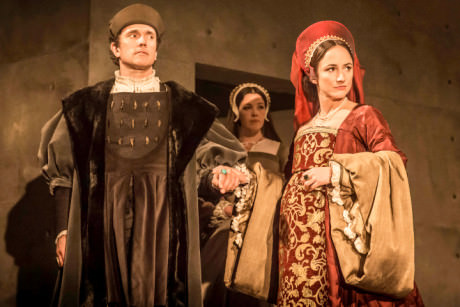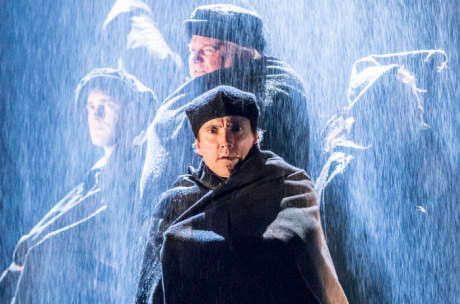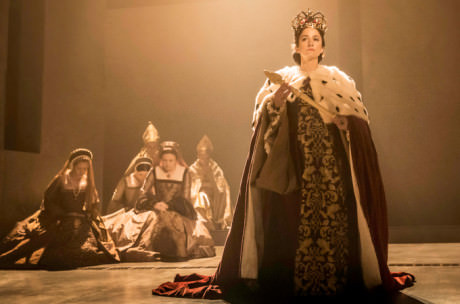Hillary Mantel is a novelist, dramatist and critic whose best known works are her two novels about the Tudor statesman Thomas Cromwell. The play Wolf Hall is the collective title of two long plays that cover material from Wolf Hall and Bring Up The Bodies and it relates to the name of the Seymour family’s home. Wolf Hall is an odd choice of title because the plays that emerged are really one long one, running about six hours. To make them user-friendly they are played out in two performances, and can be viewed at matinee and evening on the same day.
The first of them deals with Henry VIII and his marriage to Katherine of Aragon, who cannot deliver him a male heir. As his desire for one consumes the king, the first play deals mostly with his use of his right arm Thomas Cromwell to try to make a deal with the head of the Catholic Church in Roman Catholic England to allow an annulment of his marriage to Katherine so he can try again with wife #2, the ambitious and lusty Anne Boleyn. After six hours of input, we learn that Anne has delivered a daughter and one still born son. Henry has grown impatient, he’s banished his first wife to a nunnery, and turned the matter of second wife Anne over to the courts to be tried as a traitor. Her fate is sealed when she’s found guilty, and the first play leaves Henry on the verge of a third marriage to the young and willing Jane Seymour.

As adapted by Mike Poulton and directed by Jeremy Herrin for the Royal Shakespeare Company, Jeffrey Richards and Jerry Frankel have brought us their production for a limited run at the Winter Garden Theatre. They’ve imported the London company of fine actors, which includes Ben Miles (Cromwell), Nathaniel Parker (King Henry VIII), Lucy Briers (Katherine,) Lydia Leonard (Anne), and Leah Brotherhead (Jane), who rises from the ranks as lady in waiting to Katherine, then Anne, and finally as Henry’s third wife, the Queen of England. A battery of clergymen are led by Paul Jesson as Cardinal Wolsey and later as several other important catholic dignitaries.
You will never enjoy a history lesson more, for Mr. Herrin’s approach to staging this complex saga is precise, inventive, and always exciting. Each evening starts with an upbeat presentation of the entire cast, resplendent in the clothes of the period (mid-16th century). They present themselves to us as the raw material from which will be stitched an exciting tale of palace intrigue, demanding political acumen, infidelity behind almost every closed door, religion causing trouble in high places.

The various British accents catch us missing a point or two, but Ben Miles and Nathaniel Parker as Cromwell and Henry, the plays’ chief protagonists, engage us totally in the surprising ways in which Cromwell ingratiates himself to the king, always protecting his own back while doing his best to look after England’s best interests. There are those in high places; princesses, ambassadors, lords and ladies who do all they can to sabotage his efforts. We like Cromwell, root for him, and enjoy watching him maneuver his way with them all, for his adversaries are wealthy and powerful while he is the son of a blacksmith whose childhood was a disaster, a truly self-made man, deeply resented by many better born than he. You can see how readily contemporary audiences identify with these characters. With great elan, their story comes right out of pulp magazine articles on the stands in supermarkets, dealing with Hollywood royalty instead of the clan called Tudor.
The play feeds us with little known facts about the secularization of England, and new attitudes which opened doors and windows leading to the Bill of Rights and our own Constitution in these United States two hundred years later. But the banishment and ultimate death of Cardinal Wolsey whose power over the English throne was potent when Henry began his reign, came at a turbulent time and the beginning of a new order of protest that would emerge and continue to cause chaos even until now.

Christopher Oram’s scenic concept is simple and eloquent. It allows for fluidity and clarity and keeps things moving beautifully. His costume design is elegant and richly detailed so we are always aware of the pomp and circumstance of the Tudor age. Most importantly it keeps Thomas Cromwell in focus for us to see what an important part he played as he rose from the lower depths to the highest ranks. If you can’t manage two separate visits to Henry’s court, the first evening alone is a nourishing feast. I saw the two halves on the same day, matinee and evening, and found it all most satisfying indeed.
Running Time:
Part One: 2 hours and 45 minutes, plus an intermission.
Part Two: 2 hours and 45 minutes, plus an intermission.
Wolf Hall is playing at the Winter Garden Theatre – 1634 Broadway, in New York City. For tickets, call Telecharge at (212) 239-6200, visit the box office, or purchase them online.




